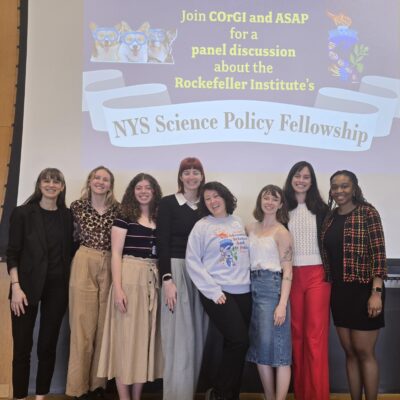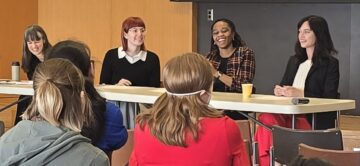Key takeaways: NYS Science Policy Fellowship panel

Almost 50 participants engaged in learning more about potential career paths for doctoral graduates in the field of policy. The esteemed panel shared overviews of their current roles and fielded many questions from the audience, as well as prepared questions that are summarized here.
How the fellows found their way to this position
- Finding career opportunities during PhD can be less difficult than you might think but takes intentional effort
- Capitalizing on institutional resources (like Careers Beyond Academia!)
- Reaching out and asking people in roles you’ve considered for yourself about their day to day and how they got there
Applying PhD skills to a science policy position
- Can also cater your PhD experience to opportunities you’re interested in
- Taking opportunities to learn skills in communicating
- Effective science communication
- Also other avenues for practicing communicating like participating in clubs that interact with different professionals and attending conferences and networking or participating in student governance
- Sometimes PhD skills can be very relevant to policy work
- One fellow is a trained chemist and is able to utilize their expertise in evaluating start-up grants for state-funded innovation programs
- Taking opportunities to learn skills in communicating
How working in science policy differs at the federal vs. state level and advantages of each
- Federal science policy is more bird’s eye view according to Laura Rabinow who has served on the White House Council on Environmental Quality
- A lot more hoops to jump through
- Get to participate in more broadly focused policy decisions that impact a lot of people and a lot of research being done around the country
- States have different priorities, and working with a state that’s more progressive in an area you care about can be a huge benefit to working at the state level
- Somewhat easier to reach people directly
- Can focus on things that have much more immediate impact locally
- More “boots on the ground”–oriented
- Fellows are planning and enacting initiatives that directly impact legislative districts’ constituents
The future of AI?
- People in government are continually asking for consultation with people who have expertise in AI
- It’s an open question which stakeholders will be most integrated into the process of both regulating it and integrating it more broadly
- Broad intention is to develop policy that promotes its benefits and limits its harm
- Hope is that people with AI expertise are making themselves available to lend that expertise to this effort
- State legislators are interested in being aware of its potential harms
 Panelists:
Panelists:
Laura Rabinow: Deputy Director of Research, Rockefeller Institute of Government
Megan Cassingham, Anqesha Murray and Emily Laurilliard PhD’24: Current New York State Science Policy Fellows {from left to right}
The panel discussion was held prior to individual meetings participants had with the speakers to discuss policy fellowship applications and what stands out during the selection process, to augment the chances of a successful application!
Organizers
Organized by the Graduate Student run organization Advancing Science and Policy (ASAP) and CoRGI (Chemists for Outreach and Graduate Inclusion) in collaboration with Careers Beyond Academia.
For privacy, these notes do not include the panelists’ answers to questions from the room.
Get involved!
McClintock Letters initiative
Teaming up with Science Homecoming to gather scientists, especially those conducting or whose work is enabled by federally funded research, to submit letters to the editor / op-eds about their story, the research they are currently doing, its importance, and its local impacts to local newspapers. The goal is to publish over 1,000 pieces around the country on or near June 16th – Nobel Prize-awarded geneticist Barbara McClintock’s birthday.
Vaccine Conversations with Scientists (VaCS)
An outreach initiative promoting vaccine uptake by connecting Cornell University scientists (including graduate students, postdoctoral fellows, staff, faculty, and motivated undergraduate students) with community members to have conversations about the science behind vaccines, with a special focus on the COVID-19 vaccines. Training provided!


